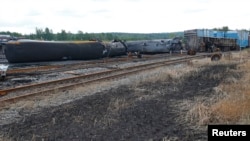Canadian police have concluded that 30 people missing since last week's oil tanker explosions are presumed dead, bringing the likely death toll from the rail disaster to 50.
Authorities met with grieving families after recovering 20 bodies in what was Canada's worst such incident in nearly 150 years. One police official said the survivors were told of the "potential loss of their loved ones."
The investigation of last Saturday's crash in Lac Megantic, Quebec is focused on the actions of the train's engineer, Tom Harding. He said he set the hand brakes on the train after he parked it outside the town late Friday as his shift ended. But a short time later, the train started to roll downhill to Lac Megantic, derailing on a curve and setting off massive blasts that leveled much of the town's business district.
The chief of the Montreal, Maine & Atlantic rail line, Edward Burkhardt, said at first he believed Harding's account, but now does not and has suspended him without pay. Police say they are investigating whether criminal negligence caused the disaster.
All but one of the train's 73 cars were carrying oil. Rail transport of oil to refineries has sharply increased in North America as pipelines have been filled to capacity during the drilling boom in Canada's Alberta province and the northern U.S. state of North Dakota.
The crash has opened a debate over the safety of rail transport of oil, even though other deadly pipeline accidents have occurred over the years.
George Bibel, the author of the book, Train Wreck: The Forensics of Rail Disasters, says he believes pipelines are much safer.
"Pipelines are significantly safer," he said. "Fundamentally, there's less moving parts, and less human intervention. We can look at the Alaskan pipeline that's been operating since 1977. It's had minor spills, but really no big events."
He said derailments are quite common, although runaway trains like the one in Canada are not. Bibel said the accident might have been averted if a second engineer had been assigned to the train.
"If it was operator error of the train, then obviously it's a lot safer if two guys are there. It's harder for two guys to screw up than one guy," he said.
Authorities met with grieving families after recovering 20 bodies in what was Canada's worst such incident in nearly 150 years. One police official said the survivors were told of the "potential loss of their loved ones."
The investigation of last Saturday's crash in Lac Megantic, Quebec is focused on the actions of the train's engineer, Tom Harding. He said he set the hand brakes on the train after he parked it outside the town late Friday as his shift ended. But a short time later, the train started to roll downhill to Lac Megantic, derailing on a curve and setting off massive blasts that leveled much of the town's business district.
The chief of the Montreal, Maine & Atlantic rail line, Edward Burkhardt, said at first he believed Harding's account, but now does not and has suspended him without pay. Police say they are investigating whether criminal negligence caused the disaster.
All but one of the train's 73 cars were carrying oil. Rail transport of oil to refineries has sharply increased in North America as pipelines have been filled to capacity during the drilling boom in Canada's Alberta province and the northern U.S. state of North Dakota.
The crash has opened a debate over the safety of rail transport of oil, even though other deadly pipeline accidents have occurred over the years.
George Bibel, the author of the book, Train Wreck: The Forensics of Rail Disasters, says he believes pipelines are much safer.
"Pipelines are significantly safer," he said. "Fundamentally, there's less moving parts, and less human intervention. We can look at the Alaskan pipeline that's been operating since 1977. It's had minor spills, but really no big events."
He said derailments are quite common, although runaway trains like the one in Canada are not. Bibel said the accident might have been averted if a second engineer had been assigned to the train.
"If it was operator error of the train, then obviously it's a lot safer if two guys are there. It's harder for two guys to screw up than one guy," he said.









